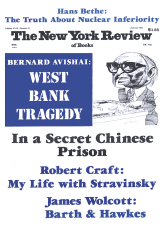In response to:
Brezhnev and After from the March 4, 1982 issue
To the Editors:
In an otherwise comprehensive analysis of the Brezhnev succession, Simon Head neglected to discuss a vital element that is certain to become salient as the succession struggle progresses. Of the several pillars of power but-tressing the Soviet regime, few can rival the military, whose buildup in recent years has strangely contrasted with the diminished role played by the marshals, generals, and admirals in the making and execution of policy. At one time, Marshal Georgi Zhukov sat on the ruling Politburo; in the early 1970s, another military man, Marshal Andrei Grechko, again established a military presence on the highest policymaking organ in Moscow. With Grechko’s death in 1976, however, the tradition of direct military input into central policymaking was nipped in the bud, just as it had been earlier, in 1957, when Zhukov was purged from all his high positions on the charge of “Bonapartism.”
Superficially, it would appear that for the past six years the military brass of the USSR have sat on the sidelines contented with continued increased defense expenditures, an aggressive R&D, and a foreign policy that matches the ideological line since 1965 of “waging offensive against the positions held by imperialism,” no matter how far from Soviet shores these may be. Soviet military strategists have been accommodating in developing strategies and weapons systems (e.g., a Soviet “RDF” [Rapid Deployment Force] capability, which is growing) to give meaning to the party line on waging the offensive.
But there also are signs that the military’s contentment has bounds. One sign was the establishment of a National Salvation regime, headed by military men, in Poland. Approved as it was by the Soviets, it bone many signs of having been conceived within the Soviet military itself. In other words, national salvation could become one day a Soviet watchword within the Homeland of Socialism itself, in the midst of spreading corruption and pacifism, both of which are repulsive bogies to the military.
True, the Soviet military has not yet been returned to the party’s inner councils; Grechko and Zhukov stand like lonely monuments of what once was or still could be. Meanwhile, political “Marshal” Dmitri Ustinov, the defense minister, sits on the Politburo as a would-be representative of the professional brass. But he hardly suffices as a true, authentic voice of military interests in every respect, Nor do any military men, as was the practice back in the 1970s, play diplomatic roles, traveling to sensitive capitals promoting Soviet interests, overseeing military-aid programs, etc. The military would like to return to the central arena of the Politburo. But how?
Through playing a role in the succession. When Suslov left the scene, the way was clearly opened for a renewed military presence, a “beachhead,” to use a combat term. The irony was heavy: Suslov had been the civilian politico who had thrown the book at Marshal Zhukov in 1957. He, too, had been the most keen-eyed overseer of the party and government’s cadres policy—i.e., putting the right men in the suitable positions—as well as acting as a civilian watchdog over the military (together with a few other top leaders, including Brezhnev). To the military, Suslov, the enemy, has left the field. It is time now for the military once again to thrust forward. It can be expected that wrinkles of such thrusting soon will appear. The USSR Ministry of Defense is dominated by professional military men, except for Ustinov, the Minister; so unless Ustinov dies (he is one of the gerontocrats), it is unlikely that the professional brass could win the top job at the Ministry of Defense, as Zhukov and Grechko had in the past.
But other possibilities present themselves. 1) Brezhnev’s passing clears the decks for any or all possible changes, just as Stalin’s did in 1953, when soon after, Zhukov made it to the top military job in the civilian-dominated defense ministry; not even Ustinov might be able to resist military pressure to make a clean sweep, protect the state at a time of succession, etc.; 2) stepped-up Soviet military activity abroad—say, in the Americas—would demand something more than the military’s presence on the State Defense Council; the possibility of a Politburo seat, say, for Chief of Staff Marshal Nikolai V. Ogarkov, already a rising star, might present itself as an imperative; 3) continuing downturn in the economy, deepening corruption touching powerful personalities, any recrudescence of dissidence—all could be exploited by the military in a national-salvation program, à la Poland.
Albert L. Weeks
New York University
New York, New York
This Issue
June 10, 1982



